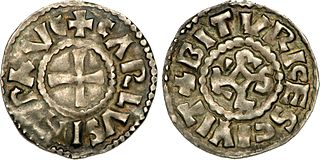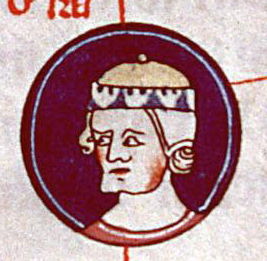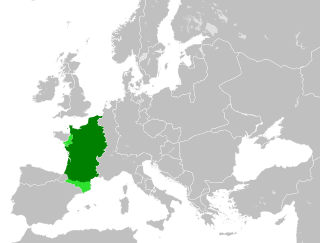This article relies largely or entirely on a single source .(November 2024) |

Arnulf (also Arnulph or Arnoul) was the illegitimate son of King Lothair of France. He became archbishop of Reims.
This article relies largely or entirely on a single source .(November 2024) |

Arnulf (also Arnulph or Arnoul) was the illegitimate son of King Lothair of France. He became archbishop of Reims.
Arnulf belonged to the Carolingian dynasty, the rule of which in France ended when Arnulf's half-brother, Louis V, died childless. Hugh Capet was elected to succeed him as king.[ citation needed ] King Hugh made Arnulf archbishop of Reims [1] in March 989, against the will of the previous archbishop, Adalberon, who had wanted to be succeeded by Gerbert of Aurillac. In September, Arnulf supported an attempt to place his uncle Charles, Duke of Lower Lorraine, on the French throne. Charles briefly held Rheims and Laon. In 990, Arnulf refused to attend a synod at Senlis and he and Charles were imprisoned on 29 March.[ citation needed ]
In June 991 Archbishop Seguin of Sens presided over a Council of Reims in the Basilica of Saint Basle, which deposed Arnulf for alleged high treason, in favour of Gerbert. This deposition was much opposed, however. Pope John XV sent Leo, abbot of Saints Boniface and Alexius at Rome, as legate to preside over a synod at Mouzon on 2 June 995. Gerbert was suspended from the episcopum. A second synod, held on 1 July, declared the whole process of deposition and elevation to be illegal and invalid. Thus, Arnulf was reinstated.[ citation needed ]
Arnulf crowned Hugh Magnus, the son of Hugh Capet's successor, Robert II, as co-king in the Capetian tradition in 1017. At this time, any resistance to the new dynasty had died in him. He held the see until his death in 1021, then the only direct male line descendant of the Carolingian family in the eldest living branch aside from his first cousin Louis, who died two years later.

Hugh Capet was the King of the Franks from 987 to 996. He is the founder of and first king from the House of Capet. The son of the powerful duke Hugh the Great and his wife Hedwige of Saxony, he was elected as the successor of the last Carolingian king, Louis V. Hugh was descended from Charlemagne's son Pepin of Italy through his paternal grandmother, and was also a nephew of Otto the Great.

Charles III, called the Simple or the Straightforward, was the king of West Francia from 898 until 922 and the king of Lotharingia from 911 until 919–923. He was a member of the Carolingian dynasty.

Robert II, called the Pious or the Wise, was King of the Franks from 996 to 1031, the second from the Capetian dynasty. Crowned Junior King in 987, he assisted his father on military matters. His solid education, provided by Gerbert of Aurillac in Reims, allowed him to deal with religious questions of which he quickly became the guarantor. Continuing the political work of his father, after becoming sole ruler in 996, he managed to maintain the alliance with the Duchy of Normandy and the County of Anjou and thus was able to contain the ambitions of Count Odo II of Blois.

Hugh the Great was the duke of the Franks and count of Paris. He was the most powerful magnate in France.

Louis V, also known as Louis the Do-Nothing, was a king of West Francia from 979 to his early death in 987. During his reign, the nobility essentially ruled the country. Dying childless, Louis V was the last Carolingian monarch in West Francia.
Pope John XV was the bishop of Rome and ruler of the Papal States from August 985 until his death. A Roman by birth, he was the first pope who canonized a saint. The origins of the investiture controversy stem from John XV's pontificate, when the dispute about the deposition of Archbishop Arnulf of Reims soured the relationship between the Capetian kings of France and the Holy See.
Adalberon, or Ascelin, was a French bishop and poet. He was a son of Reginar of Bastogne, and a nephew of Adalberon, Archbishop of Reims.

Lothair, sometimes called Lothair II, III or IV, was the penultimate Carolingian king of West Francia, reigning from 10 September 954 until his death in 986.
Adbelahide, Adele, Adela or Adelaide of Aquitaine, was Queen of France by marriage to Hugh Capet, King of the Franks. Adelaide and Hugh were the founders of the Capetian dynasty of France, which would rule France until the 18th and 19th centuries. As queen consort, Adelaide had some extent of influence over her husband's governance of France. Adelaide is typically only briefly mentioned in connection to her husband, Hugh, and her son Robert II.

Charles was the duke of Lower Lorraine from 977 until his death.

Adalbero was the archbishop of Reims, chancellor of Kings Lothair and Louis V of France.

The Kingdom of Lower Burgundy, also called Cisjurane Burgundy, was a historical kingdom in what is now southeastern France, so-called because it was lower down the Rhône Valley than Upper Burgundy.

Fulk the Venerable was archbishop of Reims from 883 until his death. He was a key figure in the political conflicts of the West Frankish kingdom that followed the dissolution of the Carolingian Empire in the late ninth century.

In medieval historiography, West Francia or the Kingdom of the West Franks constitutes the initial stage of the Kingdom of France and extends from the year 843, from the Treaty of Verdun, to 987, the beginning of the Capetian dynasty. It was created from the division of the Carolingian Empire following the death of Louis the Pious, with its neighbor East Francia eventually evolving into the Kingdom of Germany.

Drogo, also known as Dreux or Drogon, was an illegitimate son of Frankish emperor Charlemagne by the concubine Regina.
Emma of Italy was Queen of Western Francia as the wife of King Lothair, whom she married in 965. Their son, Louis V, was the last Carolingian king.
The Robertians are the proposed Frankish family which was ancestral to the Capetian dynasty, and thus to the royal families of France and of many other countries. The Capetians appear first in the records as powerful nobles serving under the Carolingian dynasty of Charlemagne in West Francia, which later became France. As their power increased, they came into conflict with the older royal family and attained the crown several times before the eventual start of the continuous rule of the descendants of Hugh Capet.
Reims, located in the north-east of modern France, hosted several councils or synods in the Roman Catholic Church. These councils did not universally represent the church and are not counted among the official ecumenical councils.
Arnulf was the bishop of Orléans from 970 until his death. He is known for his feud with Abbo of Fleury, and his denunciation of the papacy.

Louis IV, called d'Outremer or Transmarinus, reigned as King of West Francia from 936 to 954. A member of the Carolingian dynasty, he was the only son of king Charles the Simple and his second wife Eadgifu of Wessex, daughter of King Edward the Elder of Wessex. His reign is mostly known thanks to the Annals of Flodoard and the later Historiae of Richerus.